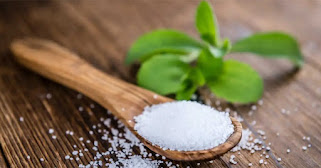The Sweet Truth About Stevia: A Healthier Sugar substitute to Regular Sugar
In today's health-conscious world, the quest for natural sugar substitutes has becomeincreasingly prevalent. Amidst this search, one name stands out: stevia. Derived fromthe leaves of the Stevia rebaudiana plant, stevia has garnered attention for its remarkable sweetness without the added calories or negative health effects associated with regular sugar. In this blog post, we'll delve into the wonders of stevia, exploring its origins,benefits, and how it compares to traditional sugar.
Unveiling the Stevia Plant
First things first, let's get to know the star of the show: the stevia plant. Native to South America, particularly Paraguay and Brazil, the Stevia rebaudiana plant has been used for centuries by indigenous populations for its sweetening properties. It wasn't until relatively recently that the rest of the world caught on to its potential as a sugar substitute.
The Rise of Stevia Sugar
As concerns about the health risks associated with excessive sugar consumption continue to mount, alternatives like stevia have gained traction. Stevia sugar, extracted from the leaves of the stevia plant, offers a sweet taste without the drawbacks of regular sugar. Unlike its refined counterpart, stevia sugar is calorie-free, making it an attractive option for those looking to manage their weight or reduce their calorie intake.
Exploring Stevia Products
Stevia comes in various forms to cater to different preferences and needs. From liquid drops to convenient sachets and dried leaves, there's a stevia product for every occasion. Stevia drops, in particular, have gained popularity for their versatility in sweetening beverages and culinary creations without the need for bulky sweetener packets.
The Benefits of Stevia
Beyond its calorie-free sweetness, stevia boasts a plethora of health benefits. One of its most notable advantages is its ability to help regulate blood sugar levels, making it a suitable option for individuals with diabetes or those aiming to stabilize their glucose levels. Additionally, stevia has been linked to improved insulin sensitivity, potentially reducing the risk of metabolic disorders.
Moreover, stevia's natural origins appeal to those seeking to minimize their consumption of artificial additives and chemicals. Unlike artificial sweeteners, which have been the subject of controversy regarding their safety, stevia is generally recognized as safe by regulatory bodies such as the FDA.
When comparing stevia to regular sugar, the differences are stark. While both provide sweetness, regular sugar is laden with empty calories and has been linked to various health issues, including obesity, type 2 diabetes, and heart disease. In contrast, stevia offers sweetness without the guilt, allowing individuals to indulge their sweet tooth without compromising their health.
Conclusion
In conclusion, stevia emerges as a clear winner in the realm of sugar substitutes. With its natural origins, zero calories, and numerous health benefits, it presents a compelling alternative to regular sugar. Whether you're looking to manage your weight, regulate your blood sugar, or simply make healthier choices, incorporating stevia into your diet can be a sweet step towards better health. So why not give this natural sugar substitute a try and experience the sweetness of stevia for yourself?
#stevia #steviapowder #stevialiquid #steviaplant #steviarebudiana #steviasachets #steviabenefits #powdersugar #sugarsubstitute #naturalsugarsubstitute #sugarfreesugar #sugarfreegreen


.jpg)

Comments
Post a Comment